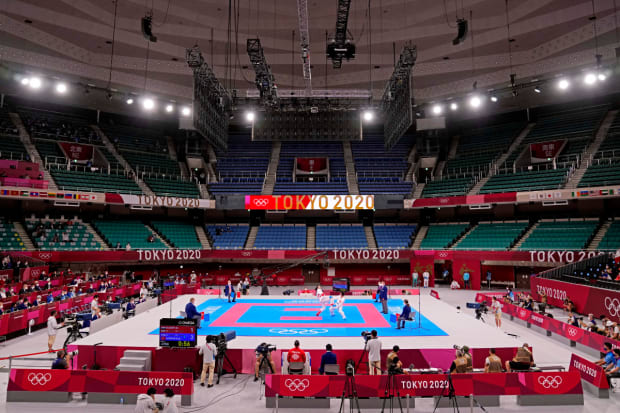With deep roots in Japan, the sport's debut in Tokyo was fitting. But the host country deserved better than these pandemic Games.
TOKYO — In a small, famed, mostly empty arena here, an Olympic sport came and went. Karate was never an Olympic sport before. It is not scheduled to be an Olympic sport again. But Japan wanted it, and so here it was.
There are two forms of karate: Kumite, wherein you try to defeat an opponent, and kata, wherein you, um, don’t. In kata, competitors compete alone, to see who can best perform a series of quick, violent moves without pulling a muscle. Then they each receive scores and a bottle of Tylenol. Kata is the figure skating of martial arts, and by tradition, it is the only kind of karate that Jewish mothers let their kids do. Nonetheless, it is a part of Japan’s sporting culture, and it would have been wonderful to see the great Japanese champion, Ryo Kiyuna, perform before a packed house in the Nippon Budokan, which is the Madison Square Garden of martial arts.
With fans, the kata competition would have done what the Olympics should do: Give a host country a chance to revel in its own brand of sport. Instead, when Kiyuna bowed forward with an intense look on his face after receiving his first-place score of 28.72 in the Pool B elimination round, I thought a director might yell, “Cut!” It felt staged. How strange to think that years from now, literally nobody on the planet will be able to say they bought a ticket to watch Olympic karate and then did it.

Were these Olympics worth it to Japan? That is an economic and public-health question, and it could take years to answer. What we can safely say, though, is that Japan deserved a better Olympics than it got.
Japan wanted the Olympics but it did not want these Olympics. You might have heard that an Asahi Shimbun poll in May showed that 83% of the Japanese public did not want to hold the Olympics this summer. But even that tells a more nuanced story than you might think. That poll, and others like it, offered the option of postponing the Games again, something the IOC insisted it would not do. Only 43% wanted to cancel outright; another 40% requested postponement.
The IOC says that as of Aug. 4, nine out of 10 people in Japan had watched the Games. But this does not mean they wanted them. People often watch what they wish would not happen. Perhaps you felt that way while viewing a presidential debate or attending a wedding for a couple that is poorly matched. Surely plenty of viewers wished the Olympics had been cancelled or postponed again, but realized they couldn’t do anything about it.
One could argue that the Games were a success because they will apparently be held to completion. One could argue that holding them was the right thing to do. Surely, almost every athlete here would say that, even those who were disappointed with their performance. Being an Olympian is a special experience. As American Ariel Torres Gutierrez said after advancing in the kata, “That was the most beautiful thing in the world, no matter what the results. I’m the happiest man to be here.”

What one cannot argue, but International Olympic Committee head Thomas Bach somehow did, is that the Games were the same without fans. Bach said “many times you did not realize that there were no spectators.” That is insulting to Japan and reflects the entitled attitude of the IOC chief. Who is Bach to tell the hosts that the Olympics didn’t need them?
The IOC is lucky that it held its pandemic Olympics in perhaps the most publicly respectful free country on earth. This is my seventh Olympics, and I’m quite sure I set the record for most people trying to help me. The hosts have been aggressively polite, so eager to please that they often stopped visitors on the off chance that any advice would be helpful, and all I wanted to ask, but never did, was: “Why on earth are you wearing pants?” I’m not saying everybody should have been naked, but the average temperature here in Tokyo has been roughly 117 degrees and it felt twice as hot. Yet pants outnumbered shorts by a wide margin. It’s a formal and orderly culture.
In Tokyo, you wear pants even when shorts are more comfortable. You cross the street only when the light says it’s time to cross, even if there are no cars in sight. You applaud a karateka with no opponent, out of admiration for the discipline that the sport requires. And when the IOC holds an Olympics that you would prefer to see canceled or postponed, you make it work anyway. Japan deserved a better Olympics. The IOC could not have asked for a better host.
More Olympics Coverage:
• I’ve Covered Nine Olympics. Nothing Prepared Me for Seeing My Daughter Win a Medal
• How Simone Biles Came Back to Win the Bronze of Her Life
• Teens Show Unique Culture of Park Skateboarding at Olympics
• Bright Future Ahead for U.S. Swimming After Tokyo Olympics